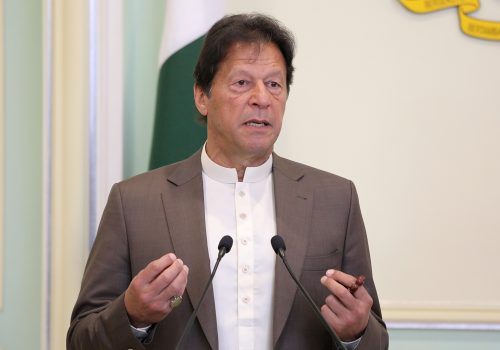On Tuesday, September 15, 2020, the South Asia Center was in conversation with author and Pakistan Supreme Court Barrister Dawood Ghazanavi discussing relations between the United States and Pakistan in the wake of intra-Afghan negotiations in Doha this week. The conversation was moderated by the Director of the South Asia Center Dr. Irfan Nooruddin.
In his opening remarks, Dr. Nooruddin highlighted the importance of repairing an otherwise fraught relationship between the US and Pakistan following nearly two decades of war in Afghanistan and opened the dialogue by emphasizing the people-to-people relations between the two countries. Dr. Nooruddin set the stage for Ghazanavi to address how Washington and Islamabad could improve collaboration with one another. Ghazanavi noted Pakistan’s role in the War on Terror recounting the long history of the relationship. According to Ghazanavi, to Pakistan’s detriment, it had gone out of its way to support US objectives at the expense of the country’s economy and the security of its people. Such an attitude was embarrassing for Pakistanis claims Ghazanavi as they felt their sovereignty was being compromised. He continued that while Pakistanis welcome peace talks between the US and Taliban, Pakistan’s role in aiding the Afghan people, as evidenced by the two million Afghan refugees living in the country, must be recognized. Author of Aafia Unheard, Ghazanavi insisted that Aafia Siddiqui’s case is a torchbearer for anti-American sentiments bubbling in Pakistan. Her arrest and detention has further fueled widespread anti-American sentiment throughout the country. Ghazanavi continued, Siddiqui’s repatriation (not necessarily release) would serve as an effective demonstration of American sincerity and concern for Pakistan, especially within the ambit of the Afghan peace process.
Following the end of the talk, there were multiple questions addressed to the speaker. Dr. Nooruddin asked what Ghazanavi used to represent Pakistani sentiment towards Siddiqui’s case, especially in his plea to US congressional leaders. Ghazanavi recounted how ordinary people such as rickshaw drivers would passionately discuss the case with him as well as the general respect he received for fighting for the case. He also contended that the US has to take two broad steps to improve relations with Pakistan: respect the sovereignty of Pakistan and win the trust of the Pakistani people by not dictating terms to them.
Washington Bureau Chief of ARY News Jahanzaib Ali contested Ghazanavi’s claims that Siddiqui’s case remains prominent in Pakistan. He also questioned whether she should be considered a “hero,” given that she has been convicted as an attempted murderer in the US, and argued that repatriating her would strengthen terrorist organizations in Pakistan. In response, Ghazanavi emphasized that repatriating Siddiqui would serve as a blow to the narrative of terrorist organizations as it would be a blow to Pakistani sovereignty.
Finally, Azeem Khan, an intern at the South Asia Center, asked if initial accounts of the imprisonment of Siddiqui’s children were true and if not, whether that was a driving factor in the loss of interest for her case and it not being at the forefront of national news in Pakistan. Ghazanavi replied that two of her children were imprisoned with her while the third was still missing, and that it had not been excluded from the current narrative.
Overall, the discussion with Mr. Ghazanavi emphasized the critical juncture the US-Pakistan relationship finds itself in and recounted the many legacies of the War on Terror. Repairing US-Pakistan relations after two decades of conflict will be decidedly difficult and grievances need to be addressed before some Pakistanis can move forward.

The South Asia Center is the hub for the Atlantic Council’s analysis of the political, social, geographical, and cultural diversity of the region. At the intersection of South Asia and its geopolitics, SAC cultivates dialogue to shape policy and forge ties between the region and the global community.


